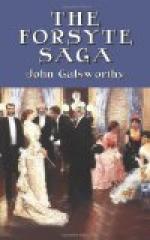“Why not Sunday? I shouldn’t be in the way on Sunday.”
He made an evident effort, and said: “I have an engagement.”
“You are going to take....”
His eyes grew angry; he shrugged his shoulders, and answered: “An engagement that will prevent my taking you to see the house!”
June bit her lip till the blood came, and walked back to her seat without another word, but she could not help the tears of rage rolling down her face. The house had been mercifully darkened for a crisis, and no one could see her trouble.
Yet in this world of Forsytes let no man think himself immune from observation.
In the third row behind, Euphemia, Nicholas’s youngest daughter, with her married-sister, Mrs. Tweetyman, were watching.
They reported at Timothy’s, how they had seen June and her fiance at the theatre.
“In the stalls?” “No, not in the....” “Oh! in the dress circle, of course. That seemed to be quite fashionable nowadays with young people!”
Well—not exactly. In the.... Anyway, that engagement wouldn’t last long. They had never seen anyone look so thunder and lightningy as that little June! With tears of enjoyment in their eyes, they related how she had kicked a man’s hat as she returned to her seat in the middle of an act, and how the man had looked. Euphemia had a noted, silent laugh, terminating most disappointingly in squeaks; and when Mrs. Small, holding up her hands, said: “My dear! Kicked a ha-at?” she let out such a number of these that she had to be recovered with smelling-salts. As she went away she said to Mrs. Tweetyman:
“Kicked a—ha-at! Oh! I shall die.”
For ‘that little June’ this evening, that was to have been ‘her treat,’ was the most miserable she had ever spent. God knows she tried to stifle her pride, her suspicion, her jealousy!
She parted from Bosinney at old Jolyon’s door without breaking down; the feeling that her lover must be conquered was strong enough to sustain her till his retiring footsteps brought home the true extent of her wretchedness.
The noiseless ‘Sankey’ let her in. She would have slipped up to her own room, but old Jolyon, who had heard her entrance, was in the dining-room doorway.
“Come in and have your milk,” he said. “It’s been kept hot for you. You’re very late. Where have you been?”
June stood at the fireplace, with a foot on the fender and an arm on the mantelpiece, as her grandfather had done when he came in that night of the opera. She was too near a breakdown to care what she told him.
“We dined at Soames’s.”
“H’m! the man of property! His wife there and Bosinney?”
“Yes.”
Old Jolyon’s glance was fixed on her with the penetrating gaze from which it was difficult to hide; but she was not looking at him, and when she turned her face, he dropped his scrutiny at once. He had seen enough, and too much. He bent down to lift the cup of milk for her from the hearth, and, turning away, grumbled: “You oughtn’t to stay out so late; it makes you fit for nothing.”




